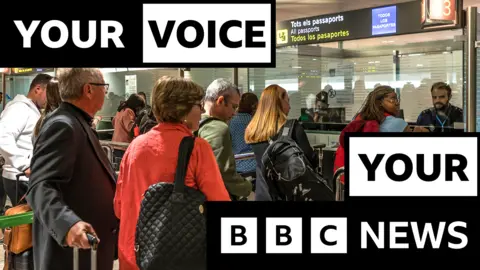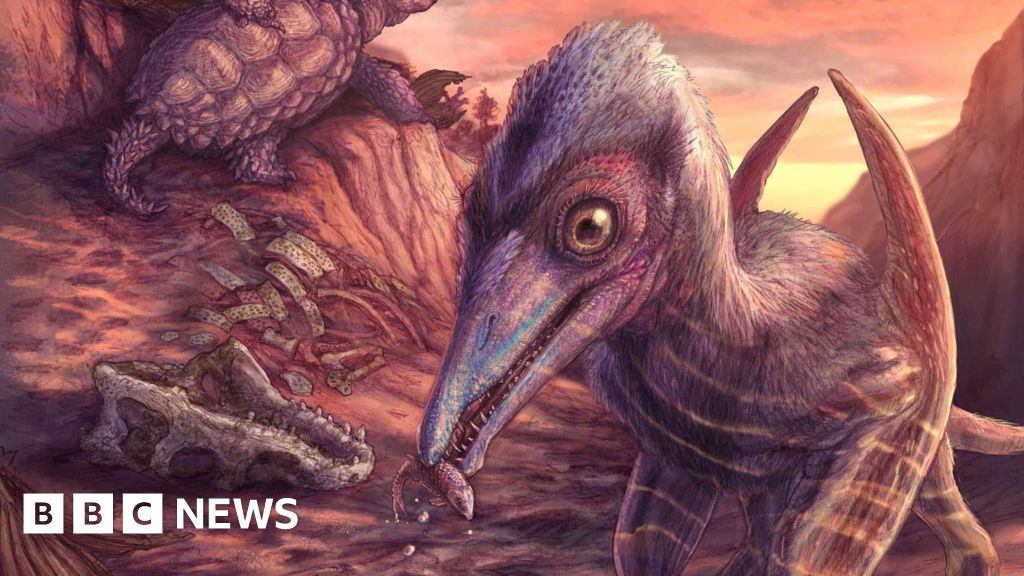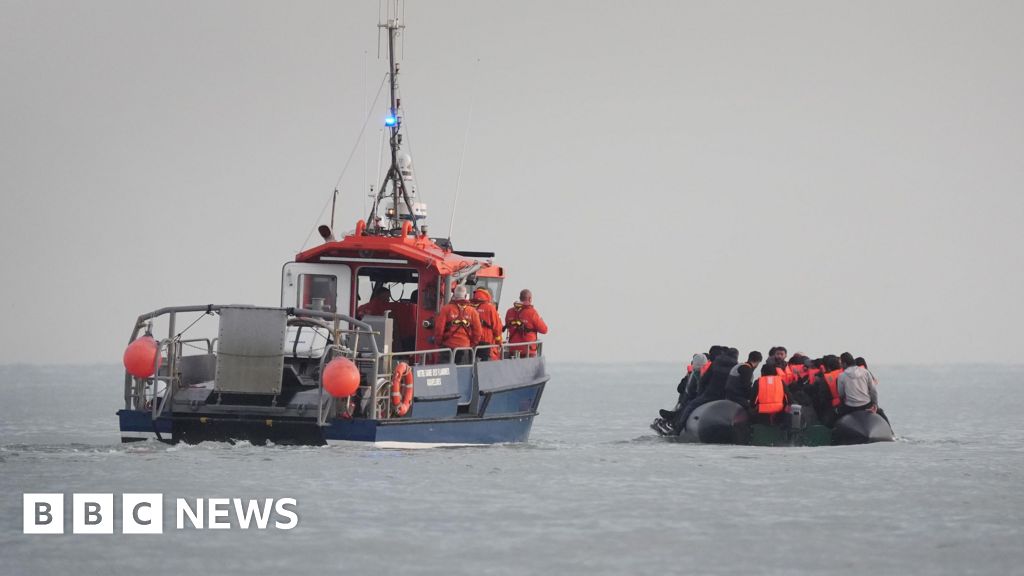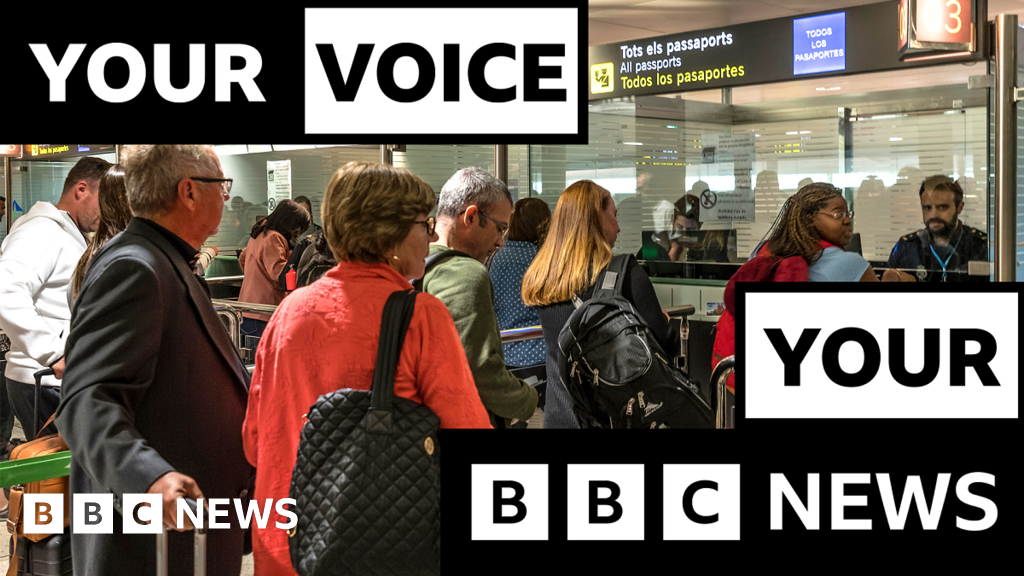 Alamy
AlamyMany of you have been submitting questions to Your Voice, Your BBC News about the deal signed this week between the UK and European Union.
Your questions have touched on a range of issues, including jobs, food and travel.
Our experts have been digging into the detail to figure out what the deal means for you and your family.

Will professional qualifications be recognised across the UK-EU border?
Anna Maria, a dental student studying in Bulgaria, asked about mutual recognition of professional qualifications, which was a Labour Party manifesto pledge. Our political reporter Becky Morton has looked into the details of the deal.
In its manifesto last year, Labour said it would seek to “secure a mutual recognition agreement for professional qualifications, external to help open up markets for UK service exporters”.
That would mean professionals such as doctors, lawyers and accountants who qualified in one country could practice in another with minimal extra bureaucracy – a system already in place across the EU.
Monday’s deal promises to set up “dedicated dialogues” on the recognition of professional qualifications, but a full agreement could take much longer to negotiate.
Such an agreement would make it easier for British companies to move staff between the UK and EU and undertake short-term work in Europe.
However, there may be less incentive for the EU to agree a deal, given the current situation makes it harder for UK firms to compete for business in Europe.
Will Brits be able to skip long queues for non-EU passport holders?
Malcolm in Bristol wanted more clarity on what the agreement will mean for passport queues for UK citizens visiting the EU. Our transport correspondent Simon Browning explains.
While some EU ports and airports already allow UK citizens to use modern e-gates, many do not and queues have become familiar to holidaymakers.
The new agreement provides more clarity on e-gates and sets out that in the future, UK citizens will be able to use them – but the EU Commission says that will not come into force in time for this summer.
However, the UK government has indicated it is hopeful there could be changes in time for the summer, so the timeline still appears to be up for debate.
The EU says there will be no change before a new EU border security scheme comes into force in October, which will see biometric data including fingerprints collected from passengers coming from non-EU countries such as the UK.
It will mean manned desks where people will have to queue in order to enter some EU countries could still be a feature of travel beyond this year, even if e-gate usage becomes more widely available.
In short, that will mean long queues at some destinations could continue during this holiday season and perhaps beyond.
Any decision about UK citizens using e-gates will not be a blanket one across the bloc. Instead, it will be up to individual countries to decide how they manage queues at their borders.
Will pet passports resume in time for the summer?
We have received a lot of questions about pet passports. Our political correspondent Jack Fenwick has looked into when the scheme will be up and running.
In short, we just do not know yet whether there will be any change in time for this summer.
The agreement between the UK and EU commits to introducing a new passport system which would make it easier for people to travel with their pets and end the need to acquire repeat vet certificates.
Many British holidaymakers will be keen for these rules to be introduced in time for their trip this year.
However, so-called pet passports come under a part of the deal known as the sanitary and phytosanitary agreement – and while the UK and EU have agreed to work together in this area, the full scope of it has not been fully fleshed out yet.
What does the deal mean for British farmers?
Chris in Bristol asked whether UK farmers would have to accept EU regulations on food standards. Our business correspondent Simon Jack has assessed the impact.
The new agreement removes the need for time consuming and costly veterinary checks and forms – but in return, the UK will have to align with EU food standards.
As those regulations change, the UK will have to change too.
The government insists it will have a say in how those rules develop and it may be able to negotiate exceptions – but they will not have a vote.
The National Farmers Union has broadly welcomed the new deal because it provides easier and quicker access to a big market for perishable products, in which the speed that goods can be moved is important.
Will it be easier for British bands to tour in Europe?
Andy in Eastbourne asked whether this deal would allow for the free and unrestricted movement of musicians and bands on tour in Europe. Our political reporter Becky Morton answered.
Since Brexit, British musicians have faced extra costs and red tape when touring Europe.
The industry has been urging the government to find a solution and Labour’s general election manifesto pledged to “help our touring artists” as part of negotiations with the EU.
But the deal agreed on Monday only recognises the “value” of touring artists and promises to continue efforts “to support travel and cultural exchange”.
The UK says it will explore “how best to improve arrangements for touring across the European continent”.
Tom Kiehl, chief executive of UK Music, which represents the industry, welcomed this as “an important first step” but said the sector was seeking “more concrete commitments”.
Will this agreement impact the UK’s ability to boost trade around the world?
Brian in Nottingham asked about any knock-on effect the agreement may have on the UK’s ability to negotiate trade deals with other nations. Political correspondent Jack Fenwick looked into it for him.
If the UK was to re-join the customs union or single market, there would be knock-on effects for other trade agreements, like the Trans-Pacific Partnership – but this relatively limited agreement does not go nearly that far.
However, the UK will now effectively be a rule-taker when it comes to EU standards on food and farming exports – but the government is fairly comfortable with that for two reasons.
Firstly, ministers do not want to lower food standards anyway, which we saw during recent trade negotiations with the US.
Secondly, the level of trade the UK has with the EU massively outstrips other agreements signed in recent years.
This UK-EU deal is expected to eventually boost the economy by around £9bn a year, largely from food, farming and energy trading. Compare that with the much broader agreement signed with India this year, which will bring economic benefits of around £5bn a year.
What does this mean for people with European holiday homes?
Neil Heard asked whether people who owned properties in the EU before Brexit would be able to spend more time there? Political analyst Peter Barnes checked it out.
There was nothing in the new agreement that would change the rules in this respect.
If a UK citizen travels to the Schengen area, which covers most of the EU and some other European countries, you do not need a visa but you can only stay for 90 days in any 180 day period.
The rule applies even if the 90 days is made up of multiple trips, and also if you stay in more than one Schengen area country. It is the total number of days that counts.
Ireland and Cyprus are not in the Schengen area and UK citizens have the right to live and work in Ireland – but for people with holiday homes in France and other EU countries, the rules are not changing.
The Schengen agreement abolished many of Europe’s internal borders, allowing freedom of movement between the countries which are signed up to it.
What does this mean for the fishing industry?
A reader in Scotland asked about the impact on the local fishing industry. Scotland editor James Cook spelled out what it means for the whole of the UK.
To understand what has gone on, we need to go back to when the UK was a member of the EU. Back then, fishing quotas were governed by the EU’s Common Fisheries Policy (CFP) under which EU boats could catch fish in UK waters and vice versa.
This was very unpopular with many UK fishermen who complained, accurately, that under the CFP they caught far fewer fish in EU waters than EU fishermen caught in UK waters.
After Brexit, the UK and the EU agreed that EU vessels could still fish in UK waters until 30 June 2026, but that 25% of the EU’s quota in UK waters (by value of fish landings) would gradually be transferred to the UK.
From 1 July 2026, EU-UK deals for fishing access were going to be negotiated annually.
But this new deal maintains the current position in terms of EU access to UK waters for 12 years, a move criticised by the Scottish Fishermen’s Federation as a “total capitulation” by the UK government.
Downing Street stressed that the EU quota in UK waters has not increased, and says the deal provides certainty – as well as streamlining the process for selling UK fish and shellfish in the EU.
Source link














